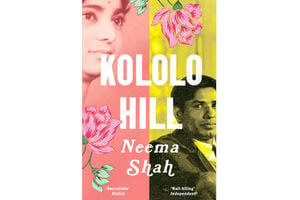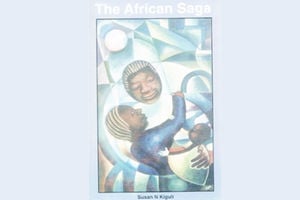
Harlord Ankwasa (right) explains poetry work to a client. PHOTOs/courtesy
President Museveni is a man with an unerring instinct for the jugular. He has often described as “useless” arts and humanities courses offered by universities in Uganda. To him, graduates of these courses are not employable in the labour market anywhere. This makes them a liability in the global quest for sustainable development.
When discussing agriculture or industry as a whole, he often wonders out loud how a verse from William Shakespeare may till the ground or turn a lathe. Science Communication through Poetry by Sam Illingworth may effectively answer his question. The author examines the potential uses of poetry within the field of science communication, both as a tool for communicating science and as a research method.
Also, there are several Ugandan artists who have chosen not to take offence to the President’s point of view. Instead, they have shown how arts and sciences can synergistically propel and sustain development.
Unspoken crime scenes
Development has many dimensions to it, namely social, economic and political. Ugandan poet Harlord Ankwasa realised this and decided to ensure that poetry could contribute to one of those dimensions. This served as his inspiration for editing the poetry anthology The Unspoken Crime Scenes.
The book explores the silence surrounding sexual violence and how this silence has normalised such an aberration.
It’s clarion call for this silence to be turned into a painful conversation begun with his six poems on sexual violence in his freshman poetry collection Walk My Path; whereby he became a catalyst for change within the Poets Association of Uganda. Together with 22 Ugandan poets, he then formed an entity—Uganda Poets Against Sexual Harassment, Assault And Rape (UPASHASAR)—dedicated to fighting for social justice. UPASHASAR also sets out to create a safe space for victims and potential victims of this vice.
The entity’s mission comes from the place that nothing compares to the might of words.
“They say the word is mightier than the sword, there’s indeed power in the word for God so used it to create the world. In a nation where the judiciary is seemingly falling by the wayside regarding this vicious act of sexual Violence, UPASHASAR thought to give words a chance in written and spoken word poetry aimed at breaking the silence of this grave error in the civilised era,” he revealed.
“We have held weekly online sessions where we host various experts and survivors to speak out boldly on this vice that has robbed them of their happiness, their education, livelihood and life,” he added.
Pan African dialogue
Poets from all over Africa have taken interest in a Pan African dialogue approach. Put simply, it involves organising poets into a pressure group for social good and turning poetry into a platform which engenders such good.
“These online sessions have gathered people of the same mind from African states to talk openly about sexual violence which has for so long been treated with silence as though it were invisible. This year, by July, we plan to start our physical sessions where we will boldly talk about this heinous cancer of society, in institutions of study like secondary schools, universities and other institutions,” Mr Ankwasa told Saturday Monitor.
It will not stop there, the problem being more commodious than that.
“[We shall be] at places of work, in our very communities where we bleed, we therefore call upon all those people tired of the silence to join this loud struggle to give justice to those violated and hope to the people that these cases will be seriously handled. Our prayer is that this book of poetry finds its way into the Institutions of higher learning, for this is where the change can ably take shape to expand to the society like a spark,” Mr Ankwasa says.
In order to pull off this, Mr Ankwasa reveals that he and his fellow poets will have a book drive where poetry books, which highlight this social ailment, add to the sound of his Unspoken Crimes Scenes.
“Well-wishers could purchase these books cheaply and together donate them to the institutions of higher learning, these books must reach students in schools and shape a debate in institutions like Universities for the students to be brave enough and embrace this fight against sexual violence,” he adds.
Quitting poetry
During the Covid-19 pandemic, he had given up on writing poetry. Then “someone’s daughter” put up a WhatsApp status saying “I will marry a poet.” She was one of the most beautiful women he had ever laid eyes on. So he decided against his decision to throw in his towelled pen, as it were, and decided to zero in on this young lass like a heat-seeking missile. Unfortunately for him, though, the lovely lady had quite enough suitors to keep her seductively unavailable. So he turned tail and returned to his advocacy against sexual violence.
Beyond thrusting bees into the bonnets of authorities with his reminders of their responsibilities to protect society’s sexual rights, he has many plans in the offing.
This year, he hopes to publish In The First 72 Hours, a poetry collection on Sexual Violence.
Poetry, when delivered in one voice, he believes, can change the world in the manner Barack Obama spoke about when he said:
One voice can change a room, and if one voice can change a room, then it can change a city, and if it can change a city, it can change a state, and if it change a state, it can change a nation, and if it can change a nation, it can change the world. Your voice can change the world.

